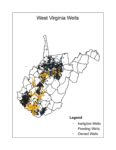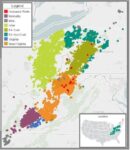Watch out for new lease or amendment terms that mean you cannot sue the driller to plug the well when it is no longer producing.
A judge has ruled that surface owners with unplugged, inactive oil or gas wells on them can sue the driller to make the driller plug the well or for money to plug the well. So watch out when companies want you to sign leases or amendments that these documents do not contain language waiving that right.
Introduction.
Federal Judge Bailey of the District Court for the Northen District of West Virginia has issued a ruling favorable to surface owners with unplugged wells on their surface. Here is a copy of the ruling. An explanation is below.
At the end of an oil or gas well’s productive life it needs to be plugged (not just capped) in order to prevent pollution of ground water, air pollution, damages to other coal and gas formations, and reduction in the surface owner’s land value. See our web page explaining this.
The Legislature has failed to pass laws to effectively make the driller plug wells that are no longer producing. (Note that the statute calls them “abandoned” wells because they have not produced for 12 months. However that is a misnomer because most of these unplugged wells still have “responsible operators” that could be plugging the wells. Those unplugged “abandoned” wells that do not have responsible operators are called “orphaned” wells.)
In addition to the weak statutes, the DEP has been meek at best in enforcing what laws there are to make the drillers plug unplugged wells. As a result, more than 12,000 unplugged wells exist today in West Virginia that should already have been plugged and that the DEP should already have made the drillers plug.
A particularly guilty company regarding unplugged wells is Diversified — as well as EQT and other companies who have the resources to plug their unplugged wells, but who have instead transferred their unplugged wells to Diversified. Diversified, in disclosures to its stockholders on a Great Britain stock exchange, has shown that it will have probably had 10,000 unplugged wells in West Virginia that will become unprofitable to operate in 2048, let alone make enough money to plug wells.
The judge’s ruling is a preliminary step in a class action brought against Diversified Energy and EQT. It says, at least, that leaving unplugged wells on surface owners is a trespass. (Diversified and EQT tried to say that the surface owners could not sue because Diversified agreed to a consent order with the DEP to plug a certain number of wells every year — which would take more than 400 years to plug them all. The Court said that the consent order did not override the surface owners’ private property right to sue.)
Even though it is a preliminary ruling we think what the ruling says is the law and that it will hold up through that law suit, and it will be relied upon by any other courts faced with the same issue. But feel free to contact us for an update.
What does the industry do in response to the judge’s ruling? Of course the industry starts inserting in new leases and in new amendments to old leases that the person signing the lease or amendment waives the right to sue the industry to plug the wells. Do NOT sign such a lease or amendment unless that language is struck out! Here is language from one company’s lease:
[N]othing in this lease shall be construed as a mandate for Lessee to remove any underground fixtures, including, but in no way limited to, pipe, casing, pipelines and/or flow Ines, and Lessor specifically waives, on behalf of the lessor and any of the lessor’s heirs, representative, successors, and/or assigns, any all future claims of damage and/or trespass if lessee elects to leave all the underground fixtures and/or lines in place [Emphasis added].
Note that if the mineral owners signing the lease are not also the surface owner at that time, then we do not think that what the mineral owner signs would be able to waive the surface owners’ right to sue. But even if you are only the mineral owner you should get that language deleted in order to protect from pollution and to be kind to your upstairs neighbor.
Summary of Court Decision
The complaint was filed in federal court in the Northern District of West Virginia. Judge Bailey was assigned to the case. The defendants, Diversified and EQT, filed a motion to dismiss the case saying that even if the surface owners proved everything they said in the complaint, the law did not give them a grounds (a “cause of action” or a “count” of the complaint) to sue.
The judge ruled for the surface owners. At some point in the future the judge will be asked to certify the class and rule on other issues.
Below is a brief summary of the “counts” in the complaint and how the judge ruled. Will the surface owner’s win on every count? Maybe, maybe not. But certainly we believe they will win on at least the first court regarding trespass, and other future surface owners can also.
As background: A mineral owner or a lessee of a mineral owner (the “driller” or “operator”) who does not own the surface nevertheless has the right to “reasonably necessary” use of the surface in order to explore for and produce the underlying minerals. (I explain this to laymen by using the example of someone who buys 10 acres in the middle of a hundred-acre tract who has an easement implied in law to get to the 10 acres even if there is not an easement across the 90 acres stated in the deed. So the mineral owner has an implied easement to use the surface to access the minerals.)
Count I states that Diversified’s wells that are no longer producing are no longer reasonably necessary for mineral production, so the driller has exceeded its rights to reasonable use of the surface, and is thus trespassing if Diversified does not plug the well and reclaim the surface. The Court ruled that Diversified continues to occupy plaintiffs’ property with non-producing gas wells and continues to leave derelict equipment on the land all of which is a continuing trespass, so enough facts were there to state a claim for relief that is plausible on its face, so the surface owners law suit can keep going on that count/grounds.
Count II claims that Diversified exceeded its right to leave equipment on the surface and that the equipment unreasonably interferes with the plaintiffs’ use and enjoyment of the land such that the continued presence of the wells is a nuisance. Reviewing the facts stated in a light most favorable to the plaintiffs, the Court concluded that the plaintiffs alleged enough facts to state a claim for relief that is plausible on its face. So, again, the surface owners’ law suit can keep going on that count/grounds too.
Count III claims that Diversified has a statutory duty to plug a well after 12 months of no production, and has breached that duty, so negligence has occurred. The Court held that at the current stage of the proceedings the plaintiffs have sufficiently alleged enough facts to state a claim for negligence that is plausible on its face. So, again, the surface owners’ law suit can keep going on that count/grounds too.
Counts IV and V are brought under Alabama’s Fraudulent Transfer Act and its successor the Alabama Uniform Voidable Transfer Act. (Diversified is incorporated in Alabama ) The facts are that EQT sold/transferred 11,000 wells and then another 900 wells together with their plugging obligations to Diversified (who in disclosures to its stockholders on a Great Britain stock exchange conceded it would have 50,000 unprofitable, unplugged wells across Appalachia in 2049). The plaintiffs want the Court to transfer the plugging obligations back to EQT who would have the money to plug them, and to create one fund from the damages awarded from EQT and another fund for damages from Diversified for the cost to plug and reclaim the non-producing wells on the surface owners’ land.
A defense raised by Diversified and EQT was that the State had entered into a consent order agreement with them for enforcement of the State’s plugging requirements. But the Court ruled that “the State’s interest in enforcing its environmental laws is distinct from private parties’ interest in protecting their property rights.” Further, that the Consent Order is simply an exercise of the State’s prosecutorial discretion and has no effect on the plaintiff’s property rights. (Prosecutors do not have to prosecute every crime that law enforcement brings to them.) Also the Court said that exhaustion of administrative remedies is not required where a statutory remedy is inadequate to fully address a plaintiff’s claims, and under the Consent Order it could take 480 years for Diversified to plug its wells during which time the surface owner’s land would be occupied.
Based on all of this the Court denied the defendant’s motions to dismiss and the law suit can keep going.
So a surface owner with a well on their property that has stopped producing oil and gas can sue the well’s the operator (if there still is one that has not gone out of business) and ask the court to either make the operator plug the well or give the surface owner a judgement for what it will cost to plug the well. Note that it is only worth suing if the operator has enough money to plug the well. And if the operator has gone out of business and “orphaned” the well there is no one to sue. The surface owner can still plug the well on the surface owners’ own dime, but it takes many, many dimes to do that. Better, report the well to the DEP and get it on a list to be plugged with a little money, and a little more money from the federal government.
The first thing to do is to get the API number off the well and contact the DEP and find out if the well still has an operator, and decide how to proceed from there. Feel free to call us for guidance.




